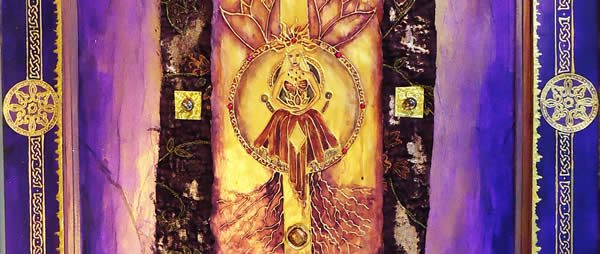Typically I don’t offer single-gender only rituals or workshops. I’m a cisgender female, so to be specific, I mean rituals/workshops/groups limited to women only. There are times, however, when I make an exception to that, usually when I’m asked to lead a women’s ritual when I’m a guest presenter at a Pagan festival. And there begins my tightrope walk with my own ethics.

The first part of that is, I will only lead a women’s ritual if women are able to self identify. Meaning, transgender women can attend. For that matter, I’m fine with anyone who is gender fluid attending if they feel called to the women’s ritual on that day.
But then I find myself walking a long tightrope of other concerns, because most women have an expectation of calling the Goddess in a women’s ritual, and I don’t really work with “The” Goddess. But I’m not a polytheist either. And then there’s the whole Maiden/Mother/Crone thing that I have huge ethical issues with. And then there’s the question of how much biology really has to do with being a woman and what that means, and what’s important in a ritual.
All of these things are very present for me since I’m offering a women’s ritual in July, and because there’s a continuing movement within Paganism (and within feminism) to exclude transgender women from women’s spaces. I’ve written numerous times about my support of transgender people, and I continue to work to help make sure that trans Pagans are not excluded from rituals, that they aren’t discriminated against simply because they are transgender.
Transgender women are especially subject to bigotry from other women under the banner of feminism. The essence of the issue is the word women. I’m all for women only spaces, as long as women can self identify. The core of the issue boils down to whether or not you believe trans women are “real” women. That’s where it becomes a civil rights issue. I strongly support women only spaces. I also strongly support people’s right to identify the gender that’s correct for them. Thus, women only spaces should include trans women too.
When I posted that above paragraph on my Facebook wall, I was inundated with comments, some of which were cisgender women adamantly insisting that they have the right to choose to associate with “biological” women only, that they need safe spaces for that. And I do plan to write about a lot of what came up on some of those threads on my Facebook, but that’s going to have to keep for a bit. In the course of writing about Ruth Barrett’s anthology, and about Alley Valkyrie getting kicked off Facebook for speaking up, and in the course of posting about transgender equality, my Facebook account went under a name review, and one of my posts was removed for violating “community standards.” I’ve heard of many others getting kicked off of Facebook (at least for a time) for speaking up on similar issues, so it’s clear to me that those who want to exclude transgender women from women’s spaces are actively engaging in internet bullying to silence their opposition.
And all of that has to do with women’s rituals, and gender, because it all interweaves. If I’m going to go and live my values, I can’t just step aside from them and offer a women’s ritual that isn’t authentic to me, or that continues tired stereotypes. Or that perpetuates more hatred and bigotry toward transgender women, for that matter.
“The” Goddess
You might think, how could you have any problem working with the Goddess? Aren’t you Pagan? Don’t you all work with the Goddess? And here’s the thing; the word Goddess is just as inherently gendered as God. God/Allah/Yahweh is assumed to be male. I’ve heard some people use the word Goddess and say, “It’s just a pendulum swing to bring things back into balance.” I’ve heard others say, “Since God is used as gender neutral, we can use Goddess as a gender neutral name to bring it back into balance.” Both of those have a certain amount of use as far as activism and words go, but they both still are bringing things back to a binary gender. You can’t say “Goddess” is gender neutral because our language doesn’t work that way.
As I mentioned earlier, I’m not a polytheist, I’m a pantheist, but I don’t see the pantheistic universal divine “all” as female. Nor, for that matter, do I see the sun as male and the moon as female, or the earth itself as female. These are anthropomorphisms that we project onto things to make them more like us.
Now–I will say that, if I go into the way back machine, the concept of the divine feminine was incredibly healing and freeing for me. I was talking to fellow Patheos blogger Annika Mongan and we discussed our differing upbringings. My mom had a Pagan friend when I was a tween/teen, and I was introduced to the idea of goddesses/the Goddess. I had visions of an angel/goddess that spoke to me; I felt her in the moonlight, in the starry sky, in the mist and the rain. She spoke to me and helped me through the bullying and abuse in middle school. I absolutely believe that having an image of the divine that wasn’t male, an image of the divine that looked like me, is part of what kept me glued together when I was on the verge of being suicidal.
And later on in my twenties, when I was working to heal from the shaming and body image issues I had accrued during that time, it was in a women’s workshop/ritual that I did a great deal of my healing. I don’t know that I’d have had that safety in the company of men.
But now, ,having done a lot of that work–and a lot of spiritual seeking–I’ve worked to move away from the gender binary whenever I feel it doesn’t serve. In ritual, particularly as more and more Pagans come out as transgender, gender fluid, or otherwise gender nonconforming, more Pagans are uncomfortable with deity presented only as a binary gender. For that matter, many Pagans are polytheists and don’t work with a single unified goddess that is all goddesses. Many Pagans don’t work with anthropomorphic deities at all.
In short, not everyone resonates with “The” Goddess.
And while I do believe that no ritual can satisfy everyone, I do work to make my rituals as inclusive as possible, so I have to think about this stuff.
I’m going to try out a concept in the women’s ritual I’m doing next month. I’m going to present the idea of “The” Goddess as a sort of translation, as a sort of shorthand for a complex concept. I’m going to hold space for the concept of “The” Goddess as a deity that may or may not have a gender. The gender of the deity is not relevant to my working; what’s relevant is that “The Goddess” is the deity that understands women and what women have gone through. The Goddess understands the misogyny, the sexism, the abuse, the rape. The Goddess understands our body image issues, our fat shame, our anger.
And The Goddess doesn’t really care about the particulars of our biology. Maybe we’re cisgender, born with a functioning uterus and ovaries. Maybe we have PCOS or we don’t have regular cycles for other reasons. Maybe we weren’t born with functioning uterus or ovaries, or had to have them removed for medical reasons, or we’re intersex. Maybe we’re transgender.
This is The Goddess of women, all women. She hears our pain…all of it. She sees our beauty…all of it.
I’ll be interested to see if this works in the ritual, the idea of The Goddess being shorthand for “The divine being who understands women.”
Maiden, Mother, Crone
The concept of Maiden, Mother, and Crone never caused me issues when I was younger, even though I never wanted kids. That was before I experienced some of the varying kinds of discrimination against women who don’t want to be mothers. In my twenties I talked about getting my tubes tied but nobody ever took me seriously. “You’ll change your mind,” people said.
And, for a brief time, I did. In my thirties I thought, maybe I would like to have a child. But that was a dream that didn’t hold for very long; I wasn’t going to do it unless I had a stable partner, and none of my relationships lasted long enough. Now I’m in my late 30’s, and I’m living with my boyfriend, his wife, and their two children, and I’ve become really clear that I never should have kids. Between seeing some of my friends have to put their dreams on hold for years to raise children, and interacting with the kids here at home, I’m very certain that having children would be the worst thing I could do. I’m not cut out to be a parent, I’m cut out to be a writer and artist.
But, while men have certainly told me that I should have kids and that “Oh, you’d be a good mom,” it’s other women who have done most of the you’re-not-a-mom shaming. It’s often so insidious that I know it’s unintentional, but it’s there. I don’t experience a lot of it, but I’ve heard from plenty of women who have. In some Pagan/Goddess Spirituality circles, there’s almost a hierarchy. Women who are mothers have more status than women without children. Women who are mothers of daughters have still higher status. I’ve even heard of some Pagan circles where women who aren’t mothers are more actively shamed and told they aren’t “real” women til they’ve given birth.
For those who are infertile, those who have had miscarriages, for those who have had abortions because of an unplanned pregnancy…and for all of those who simply have no desire to have children, or at least, are putting that on hold, this is a ludicrous kind of discrimination. While women involved in feminism often speak of misogyny and sexism from men, women are often the vehicle of our own worst shaming.
I believe that even the language used in Paganism, the focus on the fertility cycle and the use of the Maiden/Mother/Crone triplicate puts undue weight and pressure on women to be mothers, and judgment against those that are not.
I’m not suggesting that the fertility cycle has no place in Paganism. Just that we don’t need to focus solely on that, particularly when it comes to pressuring people to become mothers (or shaming them if they haven’t). When I lead Beltane rituals, I always ask if anyone present is actually looking for fertility energy to get pregnant; I’ve rarely had anyone take me up on the offer.
For the upcoming women’s ritual I’m offering, I’ll present an alternative to the Maiden/Mother/Crone with a focus on the lifecycle of being born, of coming of age, of stepping into our prime and our work (in the sense of “Work is love made visible) and then moving on to becoming an elder, and passing on and leaving our work to those who come after us. For some of us, being a mother is our work, but for many of us, it isn’t, and trying to tell women that “Mother” encompasses all their creative efforts just isn’t good enough.
What’s In Your Women’s Ritual?
I’m still working out particulars. I’ve done women’s rituals in the past that challenged offered the alternative to the Maiden/Mother/Crone piece, but I plan to go a little deeper into the “Work” aspect and focus on initiatory mysteries that have nothing to do with giving birth, periods, menopause, or biology. Or rather, if that’s what’s important to that individual, great. That’s what will be present for them. If that’s not what is important for them, great. They get to do the work that calls to them.
In the ritual, we’ll be seeking the Grail of our own power, seeking the mysteries that call us out, the mysteries at the depths of ourselves. And those mysteries are going to be different for each person. We’ll initiate into something, dedicate to something, but it’s going to vary from person to person. And it’s possible to hold space for that in a women’s ritual through open language trance, because I can guide people along a path but let them define it in the trance journey.
In my experience of leading rituals with open language trance, I provide a framework and people find what they need, and that’s all I really want out of offering a ritual. I’m still trying to understand what women want out of a women’s ritual, why a women’s ritual is important. What I hear most often is that women want safety; reading between the lines, they want safety from men. So I will do my best to offer a women’s ritual that holds that space in an inclusive way that doesn’t perpetuate gender stereotypes, that doesn’t perpetuate the gender binary as the only model.
And, that is inclusive to all women.

Patheos Pagan on Facebook.

the Agora on Facebook
Seeking the Grail is published on monthly on the third Monday. Subscribe via RSS or e-mail!
Please use the links to the right to keep on top of activities here on the Agora as well as across the entire Patheos Pagan channel.

















